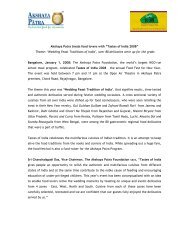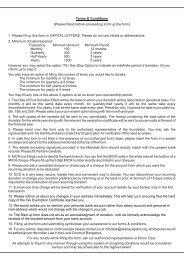The Top 100 NGOs 2013. - Akshaya Patra
The Top 100 NGOs 2013. - Akshaya Patra
The Top 100 NGOs 2013. - Akshaya Patra
Create successful ePaper yourself
Turn your PDF publications into a flip-book with our unique Google optimized e-Paper software.
a woman walks By a<br />
Fire in <strong>The</strong> ruBBle-<br />
FilleD sTreeTs oF<br />
PorT-au-Prince<br />
© un PhoTo/logan aBassi<br />
FeaTure FeaTure<br />
<strong>The</strong> gloBal Journal + January & FeBruary 2013<br />
a man seTs uP a<br />
TemPorary shelTer in<br />
<strong>The</strong> imPoverisheD ciTé<br />
soleil seTTlemenT<br />
© un PhoTo/logan aBassi<br />
On 12 January 2010, the deadliest earthquake in the history of the Western Hemisphere<br />
struck Haiti. In a country already struggling with huge developmental challenges, the<br />
disaster killed more than 300,000 people and left over one million homeless. Yet, despite<br />
an unprecedented outpouring of global generosity, the relief – and later reconstruction –<br />
effort has floundered. In this ‘Republic of NGO’s, good intentions have often gone wrong,<br />
and those driven by a humanitarian impulse have inadvertently contributed to<br />
an international response that will be remembered most for promises unfulfilled.<br />
Long before January 2010, when<br />
the sky above Port-au-Prince<br />
swarmed with foreign aircraft and<br />
aid caravans proliferated in the rubble<br />
dust, Haiti had been known for one<br />
of the world’s thickest concentrations<br />
of aid groups. <strong>The</strong> country’s everworsening<br />
poverty and proximity to the<br />
United States (US) and Europe’s island<br />
holdings, combined with an absence of<br />
major conflict, had for decades made it<br />
a place where aid workers felt needed<br />
and free to work. A persistent lack of<br />
local governance meanwhile meant that<br />
managers could experiment as they<br />
pleased. Many of the most successful<br />
projects, by their own criteria, had long<br />
since become essential providers of<br />
public services, further supplanting and<br />
weakening the state.<br />
This weakening of sovereignty was<br />
a bitter pill for the second-oldest<br />
independent republic in the Western<br />
Hemisphere. Snide references to the<br />
Caribbean nation being governed as<br />
a de facto ‘Republic of <strong>NGOs</strong>’ date<br />
back to at least the 1990s. Moreover,<br />
experienced aid workers themselves<br />
knew that the cycle of dependency and<br />
<strong>The</strong>gloBalJournal.neT<br />
94 95<br />
despondency undermined their own<br />
goals. A persistent lack of coordination<br />
among <strong>NGOs</strong> ranging from offices<br />
of the world’s pre-eminent international<br />
actors to one-man shows seemingly<br />
improvised on the spot made an<br />
effective aid regime impossible.<br />
When in mid-2009, less than a<br />
year before the earthquake, former<br />
US President Bill Clinton was<br />
appointed the United Nations (UN)<br />
Special Envoy for Haiti, one of his<br />
primary missions was to improve<br />
NGO coordination, eliminate<br />
redundancies, and see to it that





